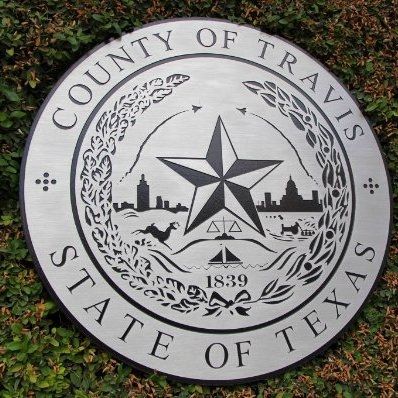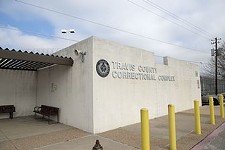District Judges Issue Order on Felony Personal Bonds
UPDATE: Uniform rules to allow defendants to avoid jail before trial
By Michael King, 8:00PM, Tue. Mar. 24, 2020

Travis County's nine criminal district court judges, who preside over felony cases, have issued a new standing order setting explicit standards for the issuance of automatic personal recognizance bonds – essentially a promise to return to court without requiring cash bail.
Under the new order, filed Tuesday but effective March 23, most nonviolent felony crimes will be eligible for APR bonds, with certain exceptions to address repeat offenses or other elements affecting public safety. The order, signed by Presiding District Judge Brenda Kennedy, begins “In the interest of justice and fairness for persons accused of felony crimes,” and notes that the Travis County District Attorney (responsible for prosecuting felonies) “does not object to the adoption of this order.”
Longtime criminal defense attorney Ed “Skip” Davis called the decision a “watershed moment” in effectively eliminating cash bail for virtually all nonviolent crimes, and District Attorney Margaret Moore said she essentially agrees, while describing the new policy as “not a huge departure from what was already taking place” in Travis County.
The new policy, while somewhat accelerated by the COVID-19 pandemic crisis, has been in development for months, in response to public pressure for criminal justice reform and recent court rulings – most specifically in Harris County, currently subject to a judicial consent decree – reducing the use of cash bail. In Travis County, the move by the felony judges was anticipated after County Court at Law judges (who preside over criminal misdemeanor cases) issued a similar order in February. The orders provide standards to magistrates, the municipal judges who make initial bonding decisions, on the expectation of the district judges – subject to the magistrates’ judgment of the best procedure in particular cases. (See “Will New Policy Reduce the Burden of Cash Bail?,” Feb. 14.)
The order lists 17 categories of state-jail and third-degree felonies for which PR bonds would be automatically available – pending specific review by magistrates. The categories include most nonviolent felony offenses: possession or delivery of a controlled substance; credit card abuse; forgery; graffiti; prostitution, and several others. The 11 exceptions include subsequent offenses while previously released, violation of previous bonds, holds for other jurisdictions, alleged hate crimes, and potential threat or danger to self or others.
At of Wednesday evening, March 25, reform advocacy groups were still working on a formal response, but had objected to similar exceptions in the misdemeanor cases as allowing too much discretion to magistrates or prosecutors. Amanda Woog of the Texas Fair Defense Project called the new policy a “step in the right direction,” but she remains concerned that “the exceptions will swallow the rule.”
In February, the judges had directed the county’s Pretrial Services agency to provide financial assessments for all arrested persons (not only for those requesting appointed counsel, as was previous policy: “District Judges Take Another Step on Bail Reform,” Feb. 17). More recently, in response to the pandemic caused by the novel coronavirus, the judges issued a directive suspending until May 8 the execution of active warrants for those offenses that would also meet the standards for PR bonds, with the intention of maintaining a lower Travis County jail population until the crisis has passed.
The new order, Kennedy explained via email, is aimed at the longer term and “provides a roadmap for those types of cases that qualify to be considered for automatic pre-trial release … when the defendants are brought in for magistration.” She adds: “However, the magistrates still maintain their authority to grant or deny release in any situation they deem appropriate …”
Kennedy noted that the new policy has been in the works for some time, in the wake of both jail population analyses by the D.A.’s office as well as recent court rulings, and described its effect as providing a “‘TSA Pre-Check’ type lane at magistration to facilitate bond release consideration for some offenses and defendants in a more efficient manner after the initial arrest.” The magistrates retain their judicial authority over initial bond determination (and any conditions), but the district judges have now formalized guidelines for those cases where they believe cash bail will or will not be necessary.
Especially within the current larger social uncertainties, the overall effects of the new policy will take some time to determine. Woog pointed to reforms in the Harris County system, where she said initial magistration has been largely eliminated and defendants instead return for a subsequent court appearance. She fears that the Travis County policy is drawn “too narrowly” and will still burden the accused with a cumbersome process and unnecessary jail time.
County Attorney David Escamilla, who has been at the center of these revisions, said it’s not clear that the Harris County procedures – which had earlier relied more heavily on bail bondsmen, creating grounds for litigation – are in the end more efficient or fair than those used here. “Advocates are describing the Harris County procedure as ‘a revolving door’ that eliminates the need for initial magistration, but the information we’ve gathered reflects it’s not that simple, and that providing magistration at the front end – and attorney assignments where needed – might well be more beneficial.”
Moore said that while she does not expect the changes to be dramatic, it will be some time before we know how many defendants are affected by the new rules. Although cash bail is explicitly made available under Texas law, she says Travis County policies have increasingly reduced its role except for violent offenses.Defense attorney Davis is more adamant. “This is a watershed event in Texas,” Davis said. “The Travis County personal bond policy now covers the broadest range of criminal offenses which will merit post-arrest release … in the entire state. And everybody knows you can’t put the genie back in the bottle. So I say that except for violent crimes, this spells the end of the cash bail system as we know it."
Got something to say on the subject? Send a letter to the editor.
A note to readers: Bold and uncensored, The Austin Chronicle has been Austin’s independent news source for over 40 years, expressing the community’s political and environmental concerns and supporting its active cultural scene. Now more than ever, we need your support to continue supplying Austin with independent, free press. If real news is important to you, please consider making a donation of $5, $10 or whatever you can afford, to help keep our journalism on stands.
Michael King, Oct. 29, 2020
Michael King, March 26, 2020
Michael King, Feb. 7, 2020
April 19, 2024
Travis County Courts, personal bonds, criminal justice reform











